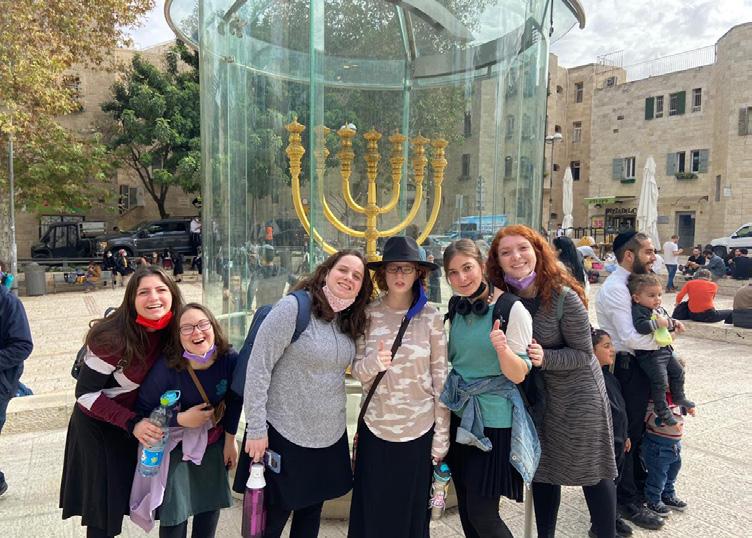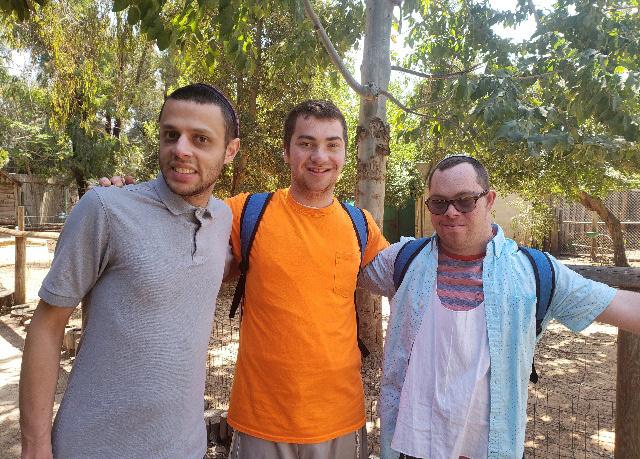
6 minute read
A Problem Without A Simple Solution Rabbi Gideon Weitzman
from Yitro
RABBI GIDEON Machon Puah for Fertility and Gynecology in Accordance with Halacha WEITZMAN
A Problem Without A Simple Solution
Last time we saw that after establishing guidelines to permit women to continue to use the mikveh during the pandemic PUAH continued to educate the public about mikveh importance and safety. These questions are still being asked. Sometimes by women who were pregnant during the past few months who did not need the mikveh until now. And sometimes by women who, despite our best reassurances, were still worried and did not go to the mikveh for months. They now feel that the worst of the pandemic is over. Some have the completely opposite view; they went to the mikveh for the entire pandemic, but now they feel that people are becoming complacent and the standards are not being upheld.
We buy your Gold & Silver
Personal home service - 30 years experience
We also buy silverware, gold & silver coins!
Please send me a picture to Whatsapp for free appraisals
972-54-219-2428
mail: absaffran@gmail.com
Follow Us On Facebook
There is an entire group of women who asked us throughout the pandemic about going to the mikveh. These are the women who are sick or in confinement (bidud) due to potential exposure to the virus. Many of these women feel fine but are not able to leave their houses due to the strict laws and fines imposed on those breaking this law.
We tried to find a solution for such women; we spoke with representatives of the Health Ministry, the government and the army, to permit these women to go to a special mikveh. But we could not find a viable solution that was safe and did not endanger them or anyone else. Since the rules of confinement are such that some of the women will eventually be discovered to be sick, while others will, in fact, be healthy, they can obviously not go to the same mikveh. This could lead to a sick woman actually infecting a healthy person.
With all our good intentions we could not find a solution for this group. This led to a whole string of related questions, both halachic, regarding the eventual immersion in the mikveh much later than the woman originally intended, and
psychological. This situation caused a lot of tension and frustration, and we were called on to speak with men and women about overcoming the anxiety and living with the uncertainty. Unfortunately, the number of people infected and suffering from this pandemic continues to rise. We need to be able to help people overcome many aspects of this virus, one of them is navigating the laws of family purity during this difficult time.
More on this next time.
The Puah Institute is based in Jerusalem and helps couples from all over the world who are experiencing fertility problems. Offices in Jerusalem, New York, Los Angeles & Paris. Contact (Isr) 02-651-5050 (US) 718-336-0603 www.puahonline.org
36 DAY
DECLUTTER CHALLENGE
Join the 36 day challenge for $1 a day + 7 bonus days to get ready for Pesach. Daily challenge email, video, how tos, & support group. Finally declutter AND get organized!!
STARTS FEB 14, 2021
JOIN TODAY! www.balaganbegone.com/36
Hotline option avaliable

DIVREI TORAH FROM YESHIVOT AND SEMINARIES
Torah Tidbits is proud to highlight the many outstanding Rabbis and teachers that lead the various Yeshivot and Seminaries here in Israel.
Ohr Torah Stone’s Yeshivat and Midreshet Darkaynu are Gap-Year programs for young adults with a range of abilities and diagnosed disabilities. Our students enjoy a structured and diverse program alongside their peers on larger, mainstream campuses. English-speaking students come from as far away as Australia, South and North America, as well as Europe and Israel to enjoy the formative experience of a year in Yeshiva or Midrasha. Our curriculum focuses on living independently as a Torah-observant Jew and includes practical classes in Kashrut, Hilchot Shabbat / Chaggim, and Parshat HaShavua as well as social skills classes and workshops. As our students prepare for life as contributing members of their respective communities, we spend a significant portion of the day on vocational training wherein each student is paired with a job and and a job coach for the duration of the year. Students develop job skills, work ethic, and most importantly a sense of belonging as they join the team at their respective jobs.

Avi Ganz
Director, Yeshivat Darkaynu
Parshat Yitro describes the dramatic scene at Matan Torah: thunder and lightning, smoke……an otherwise barren mountain, the medrash tells us, miraculously blossomed with pretty flowers in honor of the occasion, and Moshe Rabbeinu comes down from the mountain with a message for his people. Before he can share this message, Klal Yisrael famously exclaims: 'ה רֶּבִּד־רֶׁשֲא לֹּכ הֶׂשֲעַנ – Whatever HaShem says, we will do. In short: Na’aseh, V’Nishma – “We will do, and (then) we will listen.”
Bnai Yisrael were rewarded for their blind faith: as the meforshim explain, it was not that they were somehow able to intuit the Mitzvot before their instruction, but that they were willing to fulfill the mitzvot before understanding them.
In contrast, during his farewell speech in Parshat Ki Tavo, Moshe Rabbeinu instructs Bnei Yisrael: "לארשי עמשו תכסה" “Hearken and listen, Yisrael”. The Gemara in Berachot, 63b, suggests that this word (תכסה) means to first listen and digest, and then to ask questions or share comments.
Something about the message of Ki Tavo seems to have warranted the opposite approach from that of עמשנו השענ. What was it?
When Bnei Yisrael left Mitzrayim, we were in our early stages of development as a nation. At a time in our development when all of our physical needs were taken care of….. when there was very little about which to worry and our focus was on our spiritual development, questioning would be very out of place – indeed, Na’aseh V’Nishma was clearly the appropriate response. Like a young child, we knew that we could rely on our Father not only for sustenance, but guidance, and instruction as well and we expressed that faith in our willingness to do without fully understanding.
In Ki Tavo, Moshe Rabbeinu says “תכסה םעל תייהנ הזה םויה לארשי עמשו” You are about
to cross into Eretz Yisrael and become a (mature) nation. You are going out “on your own”, as it were, and decisions need to be considered differently.
At Har Sinai, we were children: uninitiated and more or less unaccountable. We had one job: to trust in God.
When we entered Eretz Yisrael as a mature nation, we bore the responsibility of our actions and the onus of our sustenance. At that time, Moshe Rabbeinu reminds us: םעל תייהנ םויה – לארשי עמשו תכסה. Pay
attention to the details of each Mitzvah as it is performed. See The Yad HaShem in your fields and in your homes; in the food you eat and the clothes you sew….. in the way you breed your animals and in the way you develop your cities. At a time when it is perhaps harder to trust because we sense our own responsibilities and participation, that is when a closer look is necessary.


When we arrive at the realization that everything comes from HaShem, we can and should exercise עמשנו השענ. Until then, as we engage in and with the corporeal world, we must look for and identify The Godliness in all. לארשי עמשו תכסה.
Rabbi Dr. Meir Tamari z"l's family
would like to invite anyone who either knew Dr. Tamari or were inspired by his writings or lectures to write something small for the journal that is being put together for his Shloshim. All articles should be mailed to either: bweinberger@kingsharbor.com or shoshanazimmer@yahoo.com







